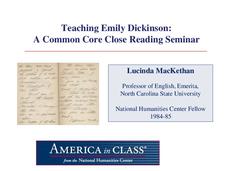Curated OER
Moving With Your Roots
Students dissect common words to study the origins of those words. In this language arts lesson, students study the Greek and Latin roots found in many words within English language. Students use dictionaries to fill out worksheets...
Curated OER
Trees
Students explore tree species based on their features. In this tree lesson, students visit a wooded area and work with a partner to describe distinctive features of trees using all of the senses except "sight." A discovery worksheet is...
Curated OER
What's On Your Plate?
Students explore the use of sensory details in writing. In this journal writing lesson, students write four journal entries after group discussion about a variety of topics such as their weekend, poverty in the United States, and...
Curated OER
We Write to Read
Young scholars are introduced to cursive handwriting as a symbolic language system. For this cursive handwriting lesson, students apply the Peterson sequence approach and practice gross motor patterning and action word rhythm. Young...
Curated OER
Making a Treasure Your Own: Lesson Two
High schoolers write an essay describing the Curtis Center and what they learned there. In this descriptive writing essay, students discuss the five paragraph essay and review sensory discoveries from their trip. High schoolers draft an...
Curated OER
All Quiet On The Western Front
Students create a poem on the subject of war. In this All Quiet on the Western Front lesson, students create poetry using phrases or lines that they brainstorm during a pre-writing session. Students enhance their poetry with sensory...
Curated OER
Descriptive Writing: Using Art to Inspire description
Write with the senses! Try using art to inspire writers to consider all of the senses. Here, the class is divided in half. Each group looks at one of two images, imagines the senses that would be engaged, and records answers to five...
ETFO
Free Verse Poetry Rubric
Follow poetry instruction with a four-category rubric designed to guide budding poets' writing of free verse poetry.
Curated OER
Fifteen Seconds of Fame
A reading of Panic in Paris launches a review of the elements of narrative writing. Class members work in groups to find narrative devices in the book and record their findings on a provided worksheet. Using the completed pages, emergent...
Curated OER
Irish Eyes: Taking a Look at Local Landscape
Direct your class’s attention to the elements that make their community unique. After examining sample travel brochures, groups select something from their community to use as the subject, and then research, create, and publish a...
Curated OER
Flying Freudian Fun: A Look At Ethical Decision Making
There are not many more apt examples of ethics gone awry than William Golding's Lord of the Flies.. Ninth graders focus the ethics of decision making with the examples provided in the plot. They focus on the concept of the psyche and how...
Novelinks
Words by Heart: Guided Imagery
Sad, depressed, miserable, inconsolable, forlorn: so many synonyms have a lot of variety with their connotations. Through the guided imagery activity, writers explore the use of connotation and its influence on imagery and description by...
Novelinks
Zach’s Lie: Guided Imagery
Close your eyes and picture a time where you decided to tell the truth to someone. What were you wearing? How did you feel? Such prompts begin a guided imagery activity for Zach's Lie. Directions for creating an environment conducive to...
Curated OER
Oliver Twist Goes to Hollywood
How does Oliver Twist, the novel written by Charles Dickens, compare with its screenplay adaptation? Although the activity doesn't require learners to have read the novel, the similarities and differences of the highlighted passages...
Curated OER
Memoir Writing Based on Jerry Spinelli's Milkweed
Using chapter 1 of Jerry Spinelli's Milkweed, middle schoolers write a personal memoir based on Spinelli's style and a Six Trait writing activity. The lesson suggests several ways to activate prior knowledge, including a picture book and...
Curated OER
Things Fall Apart: Research, Writing & Presentation Project
A great resource for your unit on Chinua Achebe's Things Fall Apart. Small groups conduct research about related topics (list included), write papers, present PowerPoint slide shows, and take a student-created test. Fill in a few gaps to...
Monarch High School
TP-CASTT Practice
Acronyms can help learners remember facts and analyze poetry. This resource includes graphic organizers for TP-CASTT, SOAPS, SOAPSTone, and DIDLS. Class members can try out one or all of these strategies to assist with that difficult job...
National Humanities Center
Teaching Emily Dickinson: A Common Core Close Reading Seminar
Three of Emily Dickinson's poems, "I like to see it," "Because I could not stop for Death," and "We grow accustomed to the Dark," provide instructors with an opportunity to model for class members how to use close reading strategies to...
Curated OER
Identifying Setting: Expository Writing
Your class can take turns describing a well know location or setting without giving its name, and the rest of the class can try to identify the location, based on the details given. They chart the elements that helped in the...
Curated OER
The Princess's Point of View
Everyone wants to be part of a royal family. Let your pupils experience the privilege of royalty by rewriting the story The Frog Prince from the point of view of the princess. While the story line remains the same, perspective is bound...
Curated OER
Visual Aural Impressions
Students view a piece of impressionist art, listen to a piece of jazz music and then write a piece about the picture in the style of beat poets. They compare their writing and look for differences in their perceptions.
Curated OER
The Personal Narrative - Part 3
Let's peer edit! Have your writers exchange their personal narratives with another learner! While peer editing, they will look for any missing information and identify strong details. They can practice literary analysis skills using a...
Curated OER
Acoustic Poems
Students explore acrostic poems. In this interactive poetry lesson, students visit the ReadWriteThink.org website to view characteristics and samples of acrostic poems. Students develop acrostic poems by using the interactive site.
Teacher's Corner
Haiku
The haiku, one of the most popular fixed forms, is the subject of this writing activity, the seventh in a series of ten poetry exercises.

























